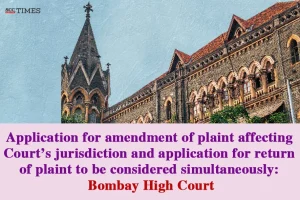Bombay High Court: The present petition was filed challenging the order passed by the Trial Court wherein the issue was whether the application for amendment of a plaint would be first decided, prior to rendering its decision on an application for return of the plaint filed by the defendants under Order 7 Rule 10 of Civil Procedure Code, 1908 (‘CPC’).
A Single Judge Bench of Valmiki Menezes, J., stated that the Trial Court should have considered the amendment application and the application for rejection or return of plaint, simultaneously. The Court further stated that the Trial Court ought to have examined simultaneously whether the amendment application, if granted, would change the nature of the suit and bring it within the jurisdiction of the Court. If the Court inherently lacked the jurisdiction and the amendment was made to bring the case within the jurisdiction of the Court, then such amendment application should be rejected. Accordingly, the Court set aside the order passed by the Trial Court and directed Trial Court to consider the averments made in the plaint as they stood when the plaint was brought before the Court, while also considering the effect of the amendment, if allowed
Background
The respondent engaged the petitioner’s services for outsourcing the accounting and financial services of his restaurant. The petitioner had published defamatory material against the respondent on Instagram, due to which the respondent filed a suit before the Trial Court seeking compensation of Rs. 50,00,000 for loss of reputation, a public apology for the allegations made and a sum of Rs.5,19,390 for outstanding the professional dues.
When the case was heard by the Trial Court, the petitioner filed an application for return of the plaint as the suit arose out of a commercial transaction covered under the Commercial Courts Act, 2015. Thus, it was contended that the Trial Court lacked the jurisdiction to entertain the suit, and therefore, it should be presented before the Commercial Court. Thereafter, the respondent moved an amendment application to amend the valuation of the suit. The issue before the Trial Court in these circumstances was whether to first decide the application for amendment or to decide its jurisdiction as question by the petitioner.
The Trial Court after referring various judgments held that it was the application of amendment which should first be decided. Aggrieved by the order so passed by the Trial Court, the petitioner filed the writ petition before the present Court.
Analysis, Law and Decision
Issue: Whether the Court should consider the amendment application first and then consider the application under Order 7 Rule 11 of CPC for rejection of plaint or under Order 7 Rule 10 of CPC for return of plaint.
The Court opined that the correct approach that the Court to follow would be to examine the plaint as it stood when the plaint was filed and consider whether on a holistic reading of the plaint suggested that whether the Court inherently lacked jurisdiction to entertain the suit. If the Court inherently lacked the jurisdiction, in such case the amendment could not be allowed to bring the suit within the ambit for adjudication by the Court.
Therefore, the Court stated that if the plaint originally filed did not fall within the pecuniary jurisdiction of the Court, then in such scenario the said Court would lack the jurisdiction to proceed with the matter. Thus, the Court would not be permitted to allow an amendment to reduce the value of a suit, to bring it within the pecuniary jurisdiction of that Court.
The Court observed that the approach of the Trial Court to firstly consider the amendment application and then consider the application for return of plaint on merits only when the amendment application failed to bring the suit within its jurisdiction, was completely erroneous. Therefore, the Court opined that the Trial Court should first have examined the plaint as it stood when filed and concluded for itself whether the plaint partook of a commercial suit. Thereafter, the Trial Court should have examined simultaneously whether the amendment application, if granted, would change the nature of the suit and bring it within the jurisdiction of the Court. It is only after examining the effect of the amendment on the plaint and the averments made in the plaint as it originally stood, that the Trial Court would have to decide whether amendment should be allowed or not. If the Court inherently lacked jurisdiction and the amendment was made just to make the case fall within the jurisdiction of the Court, then such amendment could not be allowed.
Accordingly, the Court stated that the Trial Court ought to have examined simultaneously whether the amendment application, if granted, would change the nature of the suit and bring it within the jurisdiction of the Court. If the Court inherently lacked the jurisdiction and the amendment was made to bring the case within the jurisdiction of the Court, then such amendment application should be rejected.
Therefore, the Court quashed and set aside the order passed by the Trial Court and remanded it for consideration of the averments made in the plaint as they stood when the plaint was brought before the Court, while also considering the effect of the amendment, if allowed. On considering both the applications, if it is concluded that the suit as originally filed is a commercial suit, the Trial Court shall return the plaint to be presented before the appropriate Commercial Court. However, if on considering both the applications, it concluded that the amendment application, if granted would have no effect on its jurisdiction, it would proceed to reject the application under Order 7 Rule 10 of CPC and consider the amendment application on its own merits.
[Akshay Quenim v. Royce Savio Pereira, 2025 SCC OnLine Bom 3600, decided on: 25-9-2025]
Advocates who appeared in this case:
Advocate for the Petitioner- Vibhav Amonkar, Raj Chodankar, Omkar Bhave, Advocates
Advocate for the Respondent- Kaif Noorani, Advocate

